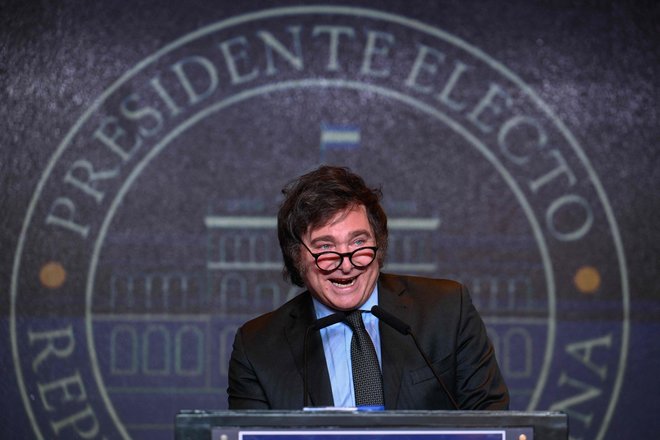Javier Mele, who won the second round of presidential elections in Argentina on Sunday, faces a series of economic challenges to re-establish himself as the third power in Latin America.
Melly, 53, an economist who describes himself as an “anarcho-capitalist”, said in his victory speech on Sunday evening that “today the reconstruction of Argentina begins”, warning that there will be no “half-measures”.
The president-elect will have to face record inflation and multiple economic difficulties, down to issues of governance, social justice and peace.
Inevitable reforms
“Argentina has been suffering from a significant budget deficit for decades: a culture of expectations of important social ‘aid’, but with limited growth, spending becomes unfunded, “says historian Rui Hora of the kunist Research Center.
He aims to reduce public spending by about 15 percent and proceed with privatization processes to achieve a budget balance sought by the International Monetary Fund, which granted Argentina in 2018 a loan of 44 billion dollars, which Buenos Aires is struggling to repay.
He also puts forward the termination of subsidies in the areas of transport and energy, liberalization of prices, the abolition of taxes on exports. Milley warned that he may resort to a much harsher adjustment than the IMF wants.
Social pressure
This desire to reduce public spending raises concerns about its social impact in a country where 40 percent of the population lives below the poverty line and 51 percent receives some kind of Social Aid or support.
Benjamin guidan, a researcher specializing in Argentina at the American Wilson Center, warned that “the pain will be acute and widely felt in the event of an actual stabilization plan,” and it is not certain that the Argentines “see the good side” of it.
Gabriel famaro, a political science researcher at the University of San Martin, said that Milli “carries with him a component of a socio-political confrontation, a sharp, hostile rhetoric, adjustments towards sectors such as the public service, which have a strong ability to mobilize” against him.
Which dollar?)
The dollarization of the economy in light of the sharp and continuous decline in the value of the peso is central to the new president’s program to “dry up” inflation. But how is the way to dollarization in a country that is sorely lacking dollars
The issue is easy for the Milli team: using the dollars that the Argentines have saved over the years. It is estimated that Argentina is the third in the world in terms of the “quantity of Dollar banknotes” available. Milli is counting on re-giving his citizens the confidence to use this money accumulated outside the financial system.
But with an official exchange rate that is considered unrealistic “369 pesos to the dollar”, the situation can” get out of control ” between now and the official inauguration of the new president on December 10. According to analyst Ana ibaragiri, the country is now entering a” phase of instability”, which may consist in the devaluation of the peso or severe inflation.
Which allies to govern
The Milli party “Libertad Avanza” entered the parliament in 2021 with three deputies. It has become the third force in the Chamber of Deputies with 38 members out of 257, where the Peronist bloc “center-left” still has a preference of “108 seats” but without an absolute majority.
It will be necessary for Mili to weave sustainable or situational alliances, as with the right-wing bloc juntos por el cambio “93 deputies”. But this bloc is closer to disintegration than ever, after it was sharply divided on whether to support milli in the second round of elections or not.
Which friends are abroad
Milley will have to restore relations with countries that are central to Argentina, which he has criticized harshly, such as Brazil and China, his country’s two most important trading partners.
“I will not deal with communists,” he said in previous statements. I am a defender of freedom, of peace, of democracy,” he said, stressing that his allies are “the United States and the free world”.
On the other hand, Milley could put forward a new approach to the Malvinas “Falklands” disputed with Britain, stressing his readiness to negotiate not on Argentine sovereignty over them, but on a long-term solution similar to what was adopted on the return of Hong Kong to Chinese sovereignty in 1997.


















